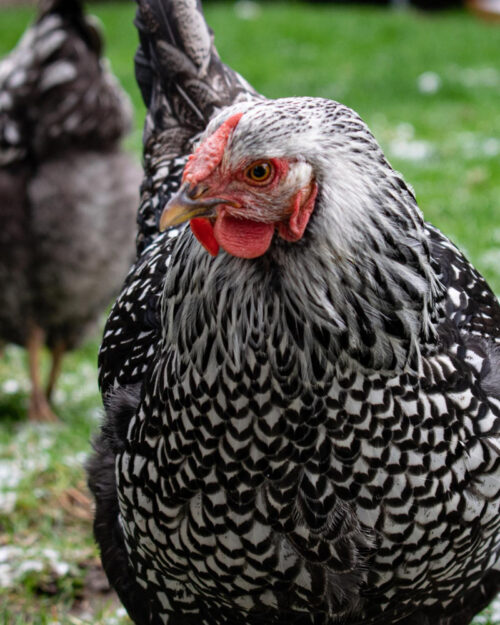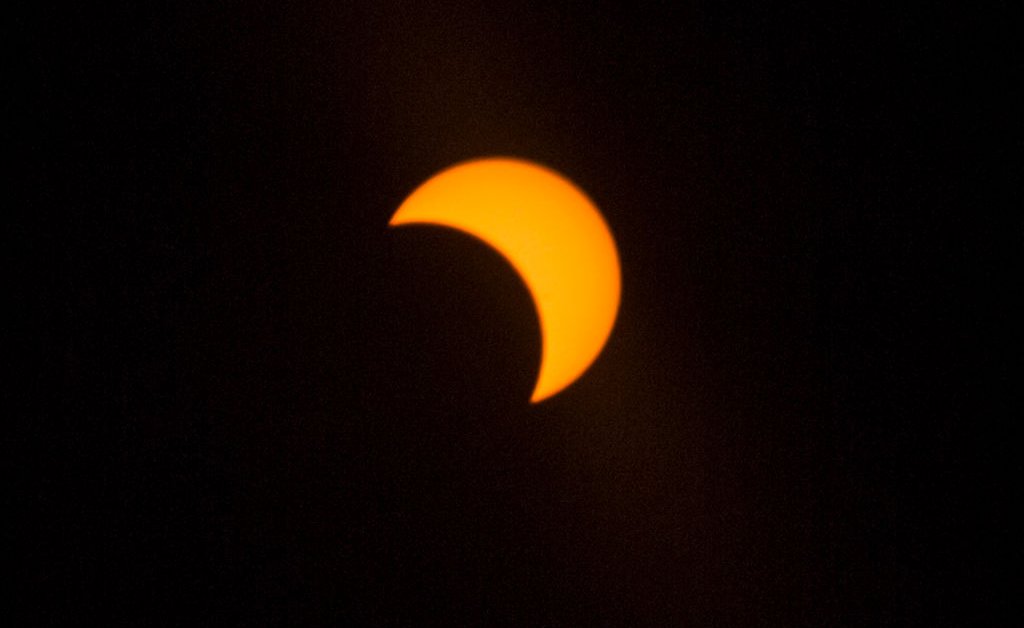How will pets react to the eclipse?

The total eclipse will be here soon. Parents, teachers, employers, tourists and scientists are all preparing for the big day in the path of totality. But what will your dog do when it gets dark? Or the cat? Will snakes even notice? Backyard chickens probably will.
CountryMax talked to a few of it team members about the potential effects of the April 8 total eclipse on animals. Here’s what they said.
Dogs and cats might not notice
Jeff Reibert, Pet Supplies Buyer
Dogs and cats take their cues from humans, so they may not notice too much. However, like any big holiday or event, there can be issues with large crowds and noise.
On a normal day, dogs don’t try to look at the sun, so it’s unlikely they’ll do so during the eclipse. If they do, yes there could be damage to their eyes. Easy to avoid by simply keeping your pets inside.
A few dogs or cats that do pay attention may freak out a little bit. Watch for excessive barking, cowering or signs of stress. The good news: This eclipse only lasts a few minutes.
Backyard birds may sing a different tune
Aaron Payne, Bird Supplies Buyer
Birders should find this event very interesting to watch. Naturally, as it gets dark and the temp starts to drop, birds may assume it’s time to go to bed, just a few hours early. You could see them start to prepare, settling down in trees, returning to barns, caves, bird houses, etc.
When it’s completely dark and you cannot really see the birds, you may notice that their song patterns change. Of course, it will all quickly return to normal when the sun comes back out.
Small animals, small changes
by Michele Federico, Pet Department Manager
This disruptive light/dark cycle could create a bit of stress for your small pets. But nothing so significant that you need to take special precautions.
•Ferrets. They sleep about 20 hours a day, so I doubt they will change their schedule at all!
•Diurnal snakes, such as corn snakes or Western hognose, may get confused when they are basking and the sun disappears. They may look for a resting place, then come out and bask again when the sun returns.
•Nocturnal snakes may be sleeping in their hide or den, and think it’s time to wake up and look for food. That would be an interesting study. If it were longer than 3.5 minutes for the animals, it would certainly throw off their sleep cycle, which could be dangerous.
•Bearded Dragons. In the wild, bearded dragons bask in the sun. When it disappears, I would assume they’ll search for cover; and right back out again when the sun reappears.
•Wildlife. Many wild animals like rabbits and deer are crepuscular, meaning they’re active during twilight hours, before the sun comes up and right before it goes down. They normally are sleeping during the day hours when the sun is at its highest, so they could think it’s time to wake up and roam for food.
Horses might lower their heads
Lexi Chaney, Merchandising Specialist and Equestrian
Not much equine research has been done as this is a rare occurrence. Most horses probably won’t have much of a reaction at all, even in areas of totality. It may cause them to react as though it is nighttime, perhaps move towards the barn to come in.
Horses may lower their heads as a sign of rest as with an evening sunset and stay close to each other. There could be a bit of confusion, and the sudden temperature drop of 5 degrees or more may be more noticeable to horses than the darkness.
Trivia Note: There was a famous racing horse in the late 18th century named Eclipse. He was undefeated in 18 national races at a time when the standard distance was four miles. The expression “Eclipse first, the rest nowhere” became an expression of dominance at the time.
Chickens: Will they roost?
Hannah Erhardt, Senior Designer, Poultry Raiser
The eclipse may affect chickens the most. Chickens have very poor night vision, so they will naturally follow their evening routine and head into their coop to roost as the sky gradually darkens for the eclipse. If your birds are out free ranging, they may seek a tree to roost in, but will most likely instinctually head to where they usually sleep.
As the sunlight returns, they will venture back out and might head right for the feeders, as they typically go eat first thing in the morning.
The good news: Your egg production should not be affected for such a small span of darkness. They will continue along their regular cadence for the current season.
CountryMax would love to know what your pets do during this eclipse. Post your pics and observations on Facebook or Instagram and use the hashtag #BackyardEclipse.
Provided information and photo




